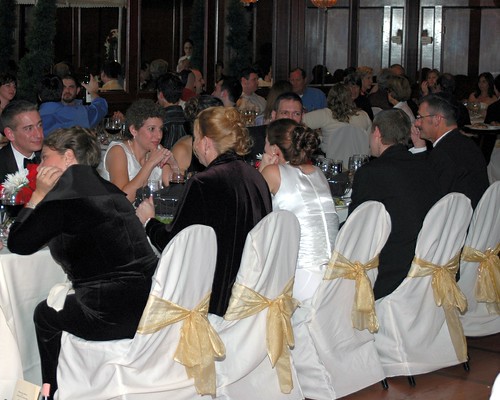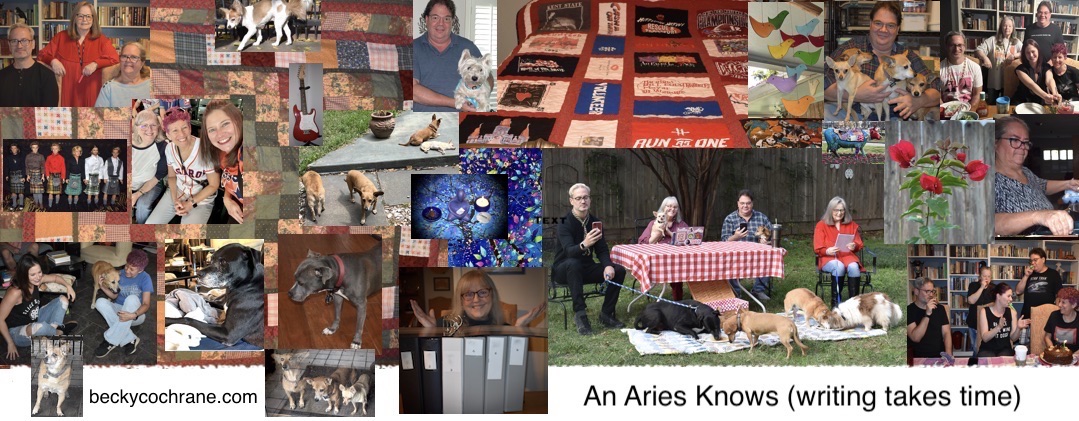One time I was shopping with a friend for a wedding gift for the daughter of another friend of ours. She picked up one of the items on the couple’s registry, sighed, and said, “I hate buying a wedding present for someone who I know will end up divorced.” “I give it two years,” I agreed.
I don’t remember if the marriage lasted even that long. Through the decades of my life, I’ve attended weddings that I thought were colossal mistakes for all kinds of reasons. The couple was too young, or mismatched, or using marriage as a means to escape some other difficulty. But in all those years and all those weddings, never once has anyone used that tense moment to “speak now or forever hold your peace.” Nor have I ever seen anyone left at the altar, though time proved that many of them surely should have been.
Maybe the reason we don’t interrupt a wedding with an objection is because despite everything, we harbor the hope that love conquers all. Or maybe it’s because we respect people’s freedom to make choices, even if we think their choices are mistakes. It’s no secret that I’m a proponent of marriage equality. Though there are many people who choose not to marry for good reasons of their own, I don’t think a couple who wants to marry should be denied that opportunity because they are both men or both women. To me, it’s the equivalent of saying “Sure you’re free, but I’m more free than you.”
Though I’ve known lots of gay and lesbian couples, I’ve been to only one same-sex wedding–Rhonda’s and Lindsey’s. Seven years later–their anniversary is on Monday–I still remember the way the room felt that night. People of all ages and backgrounds, family and friends and plus-ones, enveloped The Brides in joy and support, with happy tears and laughter, dancing and music, a meal and many conversations shared, and spontaneous outbursts of applause.

The state of Texas may not recognize the commitment Rhonda and Lindsey made that day with the legal protections that a heterosexual couple can enjoy–even the ones whose marriages dissolve in two years–or two weeks. But as laws change, couples will face more options–and sometimes those choices seem challenging.
Such is the situation between Daniel and Osvaldo in Erik Orrantia’s short story “Victoria.” When same sex couples are given the right to marry in Mexico City, it precipitates a conflict between these two ranchers who’ve carved a life out of the land in their two decades together.
Inside, Daniel stepped out of his boots, leaving them near the doorway. He grabbed a pitcher of pineapple juice from the refrigerator and set it on the kitchen table, flies lifting off from their momentary landing spots and returning to orbits in the kitchen. Beside an empty tequila bottle sat a stack of papers: bills from the grain supplier, Osvaldo’s magazines, copy of a notification from Osvaldo’s sister’s lawyers—damned big-city bureaucrats—and last week’s newspaper.
Osvaldo had asked him to take a look at it. He hadn’t gotten around to it. He sat down and lifted his socked feet onto another chair, checking the tequila bottle for any last drops. He sighed and leaned his head against the wall, tilting his sombrero over his face.
“Did you read it yet?” Osvaldo startled Daniel awake. He hadn’t heard the door open.
He pushed his sombrero up. “Ah, yeah. Well, what you said, right? They want to take away your sister’s house. Her husband—common-law husband—didn’t leave a will. No rights, right? Common law don’t mean nothin’.”
“I’m not talkin’ about my sister. I’m talkin’ about the newspaper article.”
“Ah. No. Didn’t get to it yet. Too busy.” Daniel started to shuffle through the papers on the table.
“I saw how busy you were, Dani.”
“Just a little siesta before feeding time.”
Osvaldo stepped to the table and slid the newspaper from the bottom of the stack. He plopped it in front of Daniel. Federal District Same-Sex Marriage Protected Throughout México.
The gay marriage thing. Osvaldo and his crazy ideas. “Sorry. I haven’t read it. Good for them, I guess.” He scanned down to the picture of two light-skinned guys in matching suits with flowers stuck to their lapels. Their smiles were bright, bringing out deep dimples in one man’s cheeks.
“Good for them?”
“Yeah. Let them do what they want. To each his own.”
“Quit playin’ so ignorant. You know what I’m talkin’ about.”
“What’s the point, Aldo? We’ve been here for twenty years. We’ve got more important things to do than go running around in flowery coats.”
“Exactly the point—you ain’t a youngster anymore, and neither am I. You never know what could happen. Look what’s goin’ on with my sister. They want to take it all from her. ‘She never was no good for him,’ they said. ‘She’s the reason he’s dead.’ Now they want to leave her with nothin’! I told her to get married, but he didn’t want to, and now what’s she gonna do?”
Gay marriage? Daniel could hardly think the words without feeling a little queasy. Gay. What would people think? They’d lived plenty well in a big house with enough bedrooms to maintain the townspeople’s doubt. Gay. All he needed was for their picture to show up on the front page of the newspaper, a fresh sack of corn for the town rumor mill.
“It’s not that big a deal. It’s a piece of paper,” Osvaldo said.
Daniel stood and walked into the pantry, returning with a fresh bottle of tequila. He sighed as he peeled the plastic seal from the top, setting the trash on top of the newspaper. “If it’s no big deal, just a piece of paper, then there’s no good reason for it. Who’s gonna try and take the ranch away, my old mother, my drunken brother? Anyhow, we ain’t got no one who can run the ranch for us while we’re gone.” He walked away, looking down at the bottle and at the floor. Anywhere but at Osvaldo.
You can find out whether Daniel and Osvaldo get beyond their impasse when Foolish Hearts: New Gay Fiction goes on sale January 14, 2014.
Excerpt reprinted with permission from Cleis Press. All rights reserved.

Want a perspective from someone in the clergy? They’ve taken the “if anyone can show just cause why this couple may not be lawfully joined together, let him/her speak now or forever hold his/her peace” from our Ritual for Marriage. (Acknowledgments to my RC friends for whom marriage is a Holy Sacrament.)
Most of the weddings I attend now are television weddings–TV and movie weddings tend to have a lot of those “speak now” moments (so I guess they won’t remove it from those) or left at the altar scenes. Have you ever seen either happen in real life?
I have never experienced either. There were a few weddings called off at the last minute. There were a few I officiated in years past when I was tempted not to show up; and more than a few were told by me at the end the pre-marital counseling sessions, “You guys do not need to be married to each other.” They never took my advice, though a few brides have come back to tell me they wished they had heeded the warning.
On a very few occasions I refused to administer the rite of marriage to couples and to put the church’s sanction on their union because the sacred vows were already being broken – infidelity, abuse, and other truths being withheld. It’s part of why I say only half-jokingly that given the choice, I’d choose officiating funerals over weddings.
I don’t blame you.
They should have listened to you–I wonder what the percentage is of people who actually heed wise counsel. Pretty low, I’m guessing. In all my years, I’m reasonably sure that when I’ve been asked for advice and been willing to give it, it’s rarely been followed. I hope your success rate is higher than mine.
I didn’t mean to hijack this post. Your lead in and subsequent comments to the “teaser” from your upcoming edited works are grand and yet they also touched a very raw nerve.
For good or for ill, too many folks don’t really want wise counsel. They want someone to tell them they are all geniuses and always on the right road. People don’t want honest dialogue any longer, even if it sometimes gets passionate; they prefer diatribe and then put their fingers in their ears.
If I sound cynical, it’s only because I am losing faith in humanity one person at a time.
When I first entered this vocation, I had ideas and ideals, hopes and reasons to think hopelessness could be lessened. My vocation is supposed to be about people; it has become about the preservation of an institution hiding under the mask of “reaching people.”
In talking with a “higher up” a few weeks ago about the hard work and long hours it takes to minister to those shut in by poor health or dire circumstances, this person, who took the same sacred vows as did I, said to me, “You take care of those you can. The rest will just have to get over it.” If it weren’t for those who need what I can offer, simple presence, I might have turned in my credentials in that moment. Instead I walked away saddened by what my life’s passion has become.
AH! A chance to escape. My favorite movie, Gladiator, is on. Pardon me while I live for an hour or so in a fantasy world where the good prevails.
Far from hijacking my post, you give me, as always, so much to think about. All I know is that you are one of the good ones. You always have been. Your thoughts, your words of kindness, your humor, have over the last few years made me think, comforted me, given me hope, made me laugh, and taken me through some dark moments.
I may not be in your flock, but as my friend, your return to my life has been such a gift. I suspect your “simple presence”–and your wise counsel–has has a far more profound impact than you realize.
I’m looking forward to publication!
Gay marriage here next year! Who thought the UK would be ahead of Australia..?
I wish people in general would feel as passionate about eradicating hunger, disease, and war as they are about agitating to keep some small percentage of a small percentage of the population from experiencing marriage equality.
There’s no accounting for some people’s priorities!
Truth.